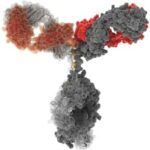 Primary immunodeficiency (PID) diseases result from genetic defects of the immune system that increase a patient’s susceptibility to infections. The types of infections that occur in patients with PID diseases are dictated largely by the nature of the immunodeficiency, which can be defined by dysfunction of cellular or humoral defenses. An increasing number of PID diseases, including those with both cellular and humoral defects, have antibody deficiency as a major feature, and as a result can benefit from immunoglobulin replacement therapy. Although immunoglobulin replacement therapy is the cornerstone of treatment for the majority of these conditions, a thorough understanding of the specific infections for which these patients are at increased risk can hasten diagnosis and guide additional therapies. Moreover, the infection trends in some patients with PID disease who have profound defects of cellular immunity, such as autosomal-dominant hyper-IgE syndrome (Job/Buckley syndrome) or dedicator of cytokinesis 8 (DOCK8) deficiency, suggest that select patients might benefit from immunoglobulin replacement therapy even if their immunodeficiency is not limited to antibody defects. In this review, we provide an overview of the predisposition to infections seen in PID disease that may benefit from immunoglobulin replacement therapy. To read the full article check here.
Primary immunodeficiency (PID) diseases result from genetic defects of the immune system that increase a patient’s susceptibility to infections. The types of infections that occur in patients with PID diseases are dictated largely by the nature of the immunodeficiency, which can be defined by dysfunction of cellular or humoral defenses. An increasing number of PID diseases, including those with both cellular and humoral defects, have antibody deficiency as a major feature, and as a result can benefit from immunoglobulin replacement therapy. Although immunoglobulin replacement therapy is the cornerstone of treatment for the majority of these conditions, a thorough understanding of the specific infections for which these patients are at increased risk can hasten diagnosis and guide additional therapies. Moreover, the infection trends in some patients with PID disease who have profound defects of cellular immunity, such as autosomal-dominant hyper-IgE syndrome (Job/Buckley syndrome) or dedicator of cytokinesis 8 (DOCK8) deficiency, suggest that select patients might benefit from immunoglobulin replacement therapy even if their immunodeficiency is not limited to antibody defects. In this review, we provide an overview of the predisposition to infections seen in PID disease that may benefit from immunoglobulin replacement therapy. To read the full article check here.
1.3K
previous post
